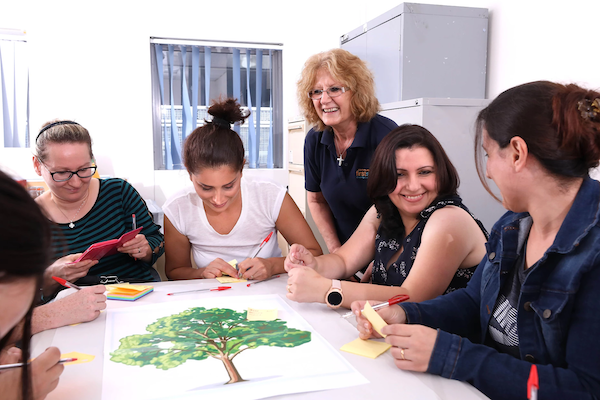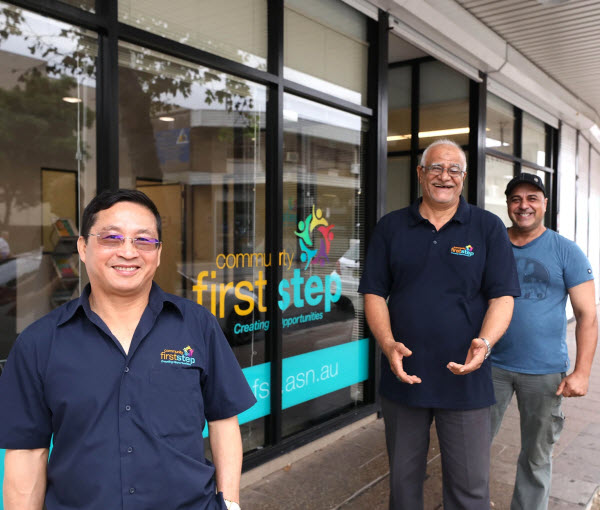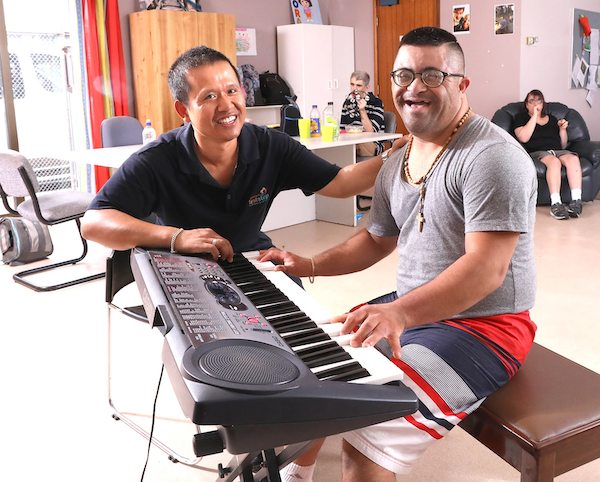
“As charitable organisations, we exist to answer social needs and to do the best we can for the community. It is essential that we identify where the best innovations are and how we can collaborate to achieve better outcomes. I see True Accounting holding a critical role within that – encouraging development of high quality governance and business administration.”
– John Gilmore, CEO, Community First Step
Community First Step (CFS) was founded in Fairfield in 1973, by a group of local residents who wanted to create a forum focused on social issues within the area. Originally known as the Fairfield Community Council for Social Development, CFS has grown and developed an impressive array of services and projects.
We talked to John Gilmore about the place-based organisation, some of the challenges they face and also True Accounting’s not for profit accounting services.

Three areas of service
With a team of around 75 full-time, part-time and casual staff, CFS is a growing organisation that provides vital services to the Fairfield Local Government Area (LGA) and beyond. These services are separated into three specific areas. John explains:
“Our Community Services focus on providing community assistance and building resilience. We help with interventions for vulnerable families that are struggling or have difficulties. We can help them coordinate services or provide advice or referrals. We also offer employment support and can help with education or career advice. Part of our Community Services includes a local hub where people can walk in off the street and access services… they get help translating information or filling in official documents.
As part of our Children Services, we offer before and after school care centres in a number of local schools. Plus, we have an occasional care centre for zero to five years, so essentially we support from zero to 12 years across our Children Services.
And under our Disability Services arm we have a range of services. We offer a centre-based day program, we provide community access to help people with regular tasks like doing their shopping or attending appointments and we provide support coordination. Plus, we provide Supported Independent Living accommodation services.”
While CFS offers three distinct areas of service, they are acutely aware of the need for a holistic approach to providing community support. John continues:
“In recent times, rather than providing three disparate service streams, we’ve been looking at how we can coordinate them and make a much more holistic service – no matter which area we engage with a family or person we try to look at their holistic needs. People are whole people… they aren’t just separated into one area of need. Often people who struggle in the community have an array of challenges and where you start might not be the only thing they need support with.”
Community support during pandemic
When the global pandemic hit in early 2020, CFS embraced a collaborative approach to provide much needed food relief to many people throughout the LGA.

“During the first wave of COVID, we were given the opportunity to partner with NSW Parliament Kitchen, in conjunction with restaurants, who were making frozen meals and distributing them through Oz Harvest.
We worked almost as a wholesaler as we distributed the meals in bulk to other smaller local organisations so they could get them to the families that needed them. In the first 12 months over 50,000 meals went out across South Western Sydney.
Because we are a smaller, place-based organisation, we were able to be much more innovative, adaptable and flexible. We were able to respond a lot more quickly than some of the larger organisations. We were very aware that right from the beginning food security was a major issue for our community as so many of our families are reliant on casual work… and they were the first people to lose their jobs.
I’m really proud of our pre-existing informal network with three other local community organisations and the Fairfield Council. When COVID hit, we coalesced to almost become a steering group. We were able to work with the other organisations to make sure we didn’t duplicate what we were doing, but also make sure there were no gaps.”
And they repeated their innovative approach during the Greater Sydney lockdown that started in June 2021.
“That level of collaboration and coordination between the local charities was really critical and came to a head again when Fairfield became the epicentre of this year’s outbreak. While a lot of the larger organisations that were funded for emergency relief had to initially pull back and close down to look at protocols and protect their staff, as local charities we were already on the ground and we had our protocols in place because we’d been dealing with it for almost 12 months.
We were able to significantly ramp up and step into the gap… particularly in food provision but also in other services. Right from the beginning of COVID we’d implemented a proactive welfare call process… rather than waiting for people to come to us, our staff started to ring all of our clients just to check in. That was really important – it gave reassurance to people if they were at home alone but also allowed us to identify significant response areas that we needed to address. That led us to develop an innovative program applying our social infrastructure in a new way.
We recognised that some parents may not have had enough devices or they might not have the language and technology skills themselves to support home learning. So in conjunction with The Parks Community Network we provided a 9am to 3pm service where we relocated some of our office computers to be used by the kids to access online learning. We developed the Kids Focus program where staff were able to work with the kids, support them and help their learning but also be able to deliver some of our other programs… along with structured play and sport. It was very well received within the community and has opened up opportunities and awareness for when we go back to normal times.”

True Accounting understands our sector
Like any not for profit organisation, the biggest hurdle CFS faces is funding and the consistency of funding streams, and John believes True Accounting gives them invaluable strategic advice… “advice that is developed and framed with a knowledge of our organisation and what we do.”
When John joined CFS in 2019, he faced the difficult challenge of replacing their financial controller. He started the recruitment process but was unable to find a suitable candidate.
“Largely because my expectation was high but my budget was a lot lower… I couldn’t find the calibre of person we needed in a single full-time team member… so I looked to AFG for their extensive expertise. They give me that flexibility… I am able to access top notch skills – I use them in the CFO role as well as the accounting role.
They have expansive capability and knowledge… with such a wide client base it means we aren’t reinventing the wheel. If I had an in-house CFO or financial controller, they would have to do all the complex research on their own… say for JobKeeper or something. The AFG team does that research once and is able to roll it out for all their clients. This provides great efficiencies and also a shared knowledge base across the NFP sector. It’s great that they can use learning from other NFPs for us and vice versa.
The Chair of our Board recently said to me that AFG makes him feel like we have a CFO – which was a major credit to AFG… the Board gets the depth and breadth of real strategic advice… it’s not just about the dollars.”

Focused on future growth
The future for CFS is focused on developing new funding streams in order to expand on their assistance for children and families.
“We know that most of our clients come from culturally and linguistically diverse backgrounds so can be very disadvantaged. And often, they aren’t eligible for government assistance because they are asylum seekers… this is why we try to keep our costs as low as possible.
It’s a community facing a lot of issues… we are at the forefront of the journey that migrants and refugees make when they come into Australia and are finding their place and developing connections and ties with the pre-existing communities.
But it is a credit to all the different groups within the community that it does have such a high level of social cohesion. The people are committed to a multicultural NSW and to the new Australian ideal of an inclusive accepting community.”
